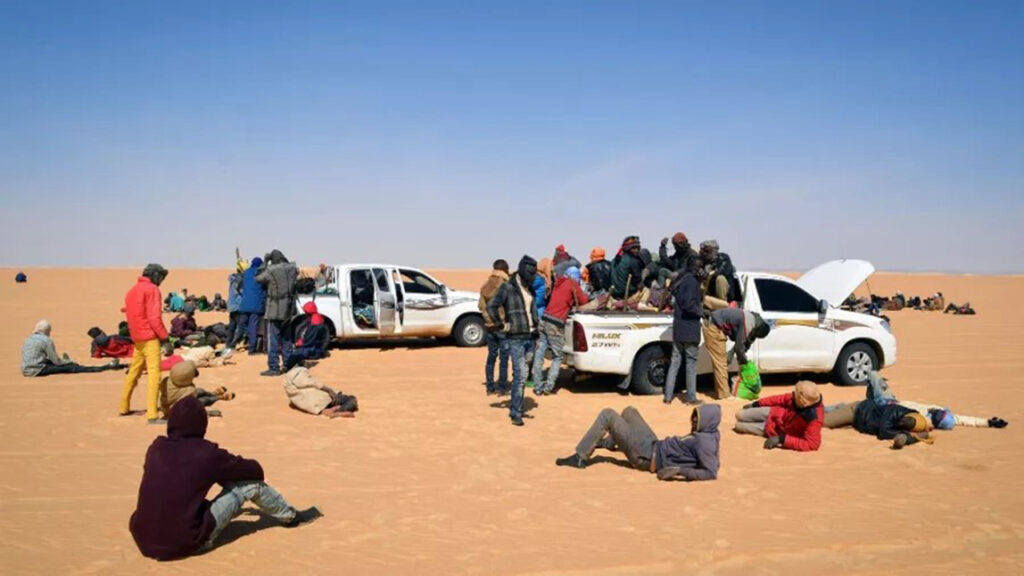
Migration, an ancient human phenomenon, largely reflects humanity’s enduring quest for better opportunities, safety, and a more meaningful existence. Importantly it has contributed immensely to the growth and development of human society. Dr. Chibuzor Ephraim Onyema, Founder/President of Blacks Ancestral Native Communities (BANC) Foundation and a leading advocate for responsible migration, in a media chat with journalists shed light on the complex challenges posed by irregular migration, particularly in African countries like Nigeria, and call for comprehensive solutions to address its root causes. APPOLOS CHRISTIAN, reports.
The associated dangers of migrating through irregular channels is so perilous and gruesome that every well-meaning citizen of the globe must talk about it and take serious action to discourage especially African youths from embarking on such journeys. In fact it is a death tunnel that almost no one survives from. Dr. Onyema said. While destination countries are encouraged to give soft landing by finding ways to regularise migration on irregular status, more efforts must be made to discourage irregular migration. He added.
As Dr. Onyema explains, regular migration involves the legal movement of individuals across borders, adhering to the laws of both the departure and destination countries. Those who migrate regularly do so with valid documents such as visas and work permits, often contributing positively to their host countries’ economies and enriching their cultural landscapes. In contrast, irregular migration involves crossing borders without the necessary documentation or overstaying visas which poses serious risks. Irregular migrants often embark on dangerous journeys, risking exploitation, human trafficking, and even death.
This issue, Dr. Onyema notes, has particularly impacted African nations, where many young people view migration as their only hope for a better life. Economic hardships, lack of opportunities, and political instability push countless individuals to undertake perilous journeys across the Sahara Desert or the Mediterranean Sea in search of greener pastures. Sadly, for many, these journeys end in tragedy.
He went further to share heartbreaking accounts of young Africans who have fallen victim to exploitation, slavery, and even organ harvesting; a harrowing reminder of the extreme dangers of irregular migration. Families left behind often live in anguish, believing their children are thriving abroad, only to learn later that they have died or been lost to human trafficking syndicates. These grim realities, he stresses, underscore the need for urgent and coordinated action.
Addressing the Root Causes
To effectively combat irregular migration, Dr. Onyema advocates for a focus on the root causes driving people to leave their home countries. Poverty, unemployment, lack of access to quality education, and political instability are among the primary factors that force individuals to seek opportunities elsewhere. Without addressing these systemic issues, the lure of irregular migration will persist.
Governments, therefore, must prioritize creating an environment where young people can thrive at home. Investments in education, job creation, infrastructure, and entrepreneurial support systems are crucial in providing viable alternatives to irregular migration. Additionally, bilateral labor agreements, like the one between Kenya and Germany, should be pursued to offer legitimate opportunities for those seeking work abroad.
Awareness and Empowerment
Dr. Onyema highlights the critical role of awareness campaigns in informing young people about the dangers of irregular migration. Many who embark on these journeys are unaware of the risks involved or the harsh realities that await them. By increasing awareness, governments and organizations can help potential migrants make informed decisions and explore safer, legal avenues for migration.
Community leaders, religious institutions, and civil society organizations also play a vital role in this effort. These groups must actively engage in educating their communities about regular migration pathways and collaborate with governments to develop programs that empower the youth.
In this regard, Dr. Onyema’s BANC Foundation has developed a comprehensive intervention program called **STARCARE**, which stands for Sensitization, Training, Advocacy, Rehabilitation, Campaigns, Advisory, Reintegration, and Empowerment. Each element of STARCARE reflects the organization’s core values of Brotherhood, Advocacy, Networking, and Congruence (BANC), and is designed to support individuals in making safer, more informed migration decisions.
A key component of BANC Foundation’s efforts is the **Irregular Migration Mitigation Skills and Resource Centre (IMMSaRC)**, which provides practical training for globally qualified skilled workers and artisans. This initiative aims to equip individuals with the skills needed to secure employment both at home and abroad, reducing the temptation to pursue irregular migration.
International Collaboration and Responsibility
Dr. Onyema also emphasizes the need for international collaboration in tackling irregular migration. Destination countries, especially those popular among migrants, have a responsibility to create safer, more transparent regular migration pathways. This would help reduce reliance on dangerous routes controlled by human traffickers and criminal networks.
Stronger cross-border cooperation is also essential in combating human trafficking syndicates and protecting vulnerable migrants from exploitation. Dr. Onyema cites a recent initiative in Sweden, where the government plans to offer financial incentives to irregular migrants who agree to return to their home countries. While such programs may not appeal to everyone, they represent a step in the right direction, providing alternatives for those in irregular status.
A Unified Response
Ultimately, addressing irregular migration requires a unified response from governments, communities, and individuals. As Dr. Onyema points out, migration itself is not inherently negative—it has historically driven economic growth and cultural exchange. However, when pursued through irregular means, it becomes a dangerous gamble with life-altering consequences.
The solution, Dr. Onyema concludes, lies in creating economic opportunities at home, raising awareness about the dangers of irregular migration, and fostering international collaboration to protect the lives and dignity of migrants. Through initiatives like STARCARE and IMMSaRC, BANC Foundation is committed to working alongside stakeholders at all levels to promote lasting peace, sustainability, and opportunity for young people—whether at home or abroad.
As Dr. Onyema so powerfully reminds us, the next generation of Nigerians and Africans deserves a future filled with hope and opportunity, not perilous journeys that endanger their lives. Migration, when pursued through the proper channels, can unlock new doors, but done the wrong way, it can close those doors permanently.






























